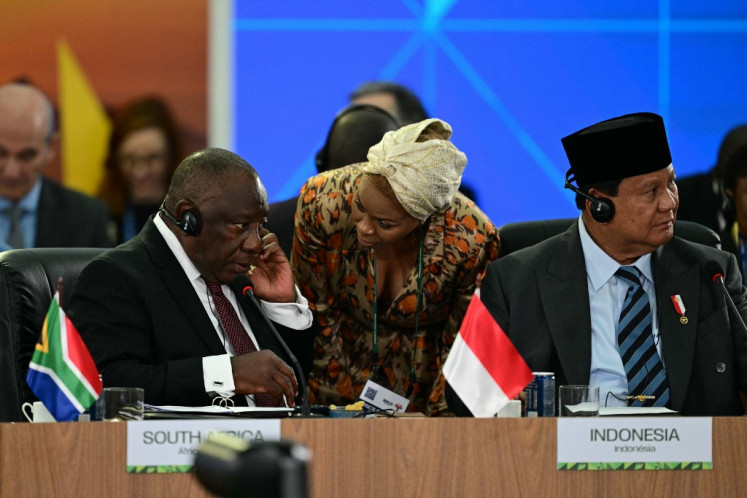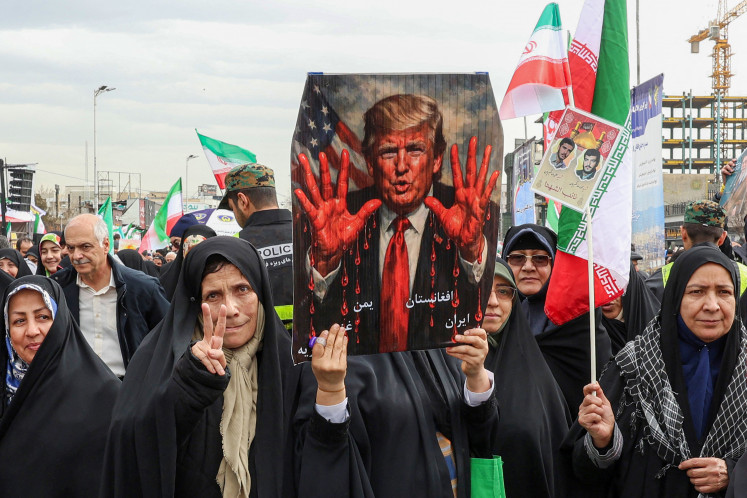Popular Reads
Top Results
Can't find what you're looking for?
View all search resultsPopular Reads
Top Results
Can't find what you're looking for?
View all search resultsUniversities need sweeping reforms to stop sexual violence
The story of a female student, identified only as Lara, who claimed she was coerced by her lecturer to have sex with him, has gone viral on social media.
Change text size
Gift Premium Articles
to Anyone
T
he story of a female student, identified only as Lara, who claimed she was coerced by her lecturer to have sex with him, has gone viral on social media. The lecturer is said to have “voluntarily resigned”, but the case remains in legal limbo as the police only charged him with violating the Electronic Information and Transactions Law for publishing her nude photos online.
In Yogyakarta, a female Gadjah Mada University student, Agni, was allegedly sexually assaulted by a university mate during their mandatory fieldwork period. The university student press reported the case, triggering both protests and controversy.
The two cases are just the tip of an iceberg that represents the depravity of structural and institutionalized sexual violence within the academic community. Conducted mostly by collecting individual testimonies, independent investigations show that sexual assault and harassment are rampant on university grounds. Lara and Agni were willing to speak out, but many more victims are muffled, unable or unwilling to speak.
What makes these cases so morally appalling is that the sexual violence was perpetrated within an academic environment. Universities are supposed to be safe places for budding students to grow intellectually and emotionally with the guidance of respectable lecturers.
Such was the ideal of the university envisioned by the philosopher Plato.
However, the hierarchical environment often perpetuates obscenely imbalanced power relations between students and their lecturers. Lecturers virtually wield nearly unchecked power over their students; they can ruin their students’ lives with a single keystroke.
On the other end, students are virtually powerless against their professors and powerless against the machinations of the institution. If they speak up, collective institutional might pummels them into submission. Students who speak up will be blamed for tainting the reputation of the institution, even if the institution was the one to fail them.
Student victims are deprived of legal protection in the first place. Although Indonesia has ratified the Convention on the Elimination of Discrimination against Women (CEDAW), victims of sexual violence, especially students, often have to face discriminatory remarks and prejudice from law enforcers and even campus authorities.
Often, they will face statements that essentially shift the blame onto them (‘What were you wearing?’) or belittle their traumatic experience (‘If you didn’t fight back, you must have been enjoying it.’). While rape is a crime, consensual sex is not. However, victims are often pressured, either explicitly or implicitly, into claiming the sexual relations were consensual.
This is not to generalize the entire academic community as being a part of this institutionalized sexual violence. However, there are often institutional barriers for people of goodwill to blow the whistle, such as threats of demotion and the absence of protection for calling out harassment. The same goes for writers of the student press, who may face institutional pressure to not investigate alleged harassment, let alone publish stories about it.
Simply put, there is a culture of permissive silence perpetuated by those in power. Agni’s plight and that of the other muffled voices will unlikely make a large difference. So far, treatment of such cases tends to be reactionary and does not address the root causes of institutionalized sexual violence.
Undeniable sweeping institutional reform is a must if universities are truly committed to their role as bastions of progressive enlightenment and not fortresses of entrenched conservative values. Considering the highly centralized nature of Indonesian academia, there is no doubt that reforms should start from the top, although this does not mean that change cannot also begin at the bottom.
Victims and whistleblowers deserve clear, accountable and legally robust procedures to voice their grievances regarding any form of sexual assault and harassment. These procedures should guarantee anonymity, legal clarity and emotional support to protect victims and whistleblowers from potential institutional backlash.
Such procedures ought to be regulated by the Research, Technology and Higher Education Ministry in order for such mechanisms to be in place in all state and private universities. In fact, instead of accrediting universities simply based on their academic performance, why not include the presence of these mechanisms?
It is not just a one-way street. Universities themselves need to change. Universities need proactive measures to foster an awareness of sexual assault and harassment. Prevention can be done through continuous education of what constitutes sexual assault and harassment, conducted either by relevant faculty members, student research groups, or in partnership with civil society organizations.
For students, sexual assault and harassment seminars may serve to raise awareness of the issue. As for faculty members, a better, although slower and costlier approach would be to provide mandatory one-on-one sessions. The idea is to ensure that faculty members understand the need to uphold ethical behavior and not abuse their power.
Universities should have zero tolerance for perpetrators of sexual assault and harassment. Lecturers who commit the crime should be stripped of any academic titles or honors and even barred from re-entering academia. Students who are found guilty of the crime, too, should face justice.
Surely, we can expect institutional resistance to the tough measures. They may be deemed too much or an over-reaction to a few isolated cases. However, must we wait for another preventable incident to occur?
Universities should not be endorsing a culture of silence and permissiveness. There should be more checks on the power relations between students and their professors.
This is one of those issues in which the collective academic community and the government need to work together to foster a safe environment for academic progress.
***
The writer lectures on international relations at President University, Cikarang. The views expressed are his own.










